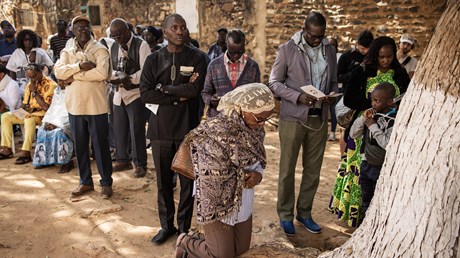Search Results for Hospital
Links
Missionaries to Preachers, Struggling Churches, and Missionaries
|
Articles
What The Bible Says Good Samaritan's Penny Pulpit by Pastor Ed Rice
|
Videos
News
Ngalakh combines baobab fruit and peanuts to end Easter in West African nation, reciprocated by the sharing of meat breaking Ramadan's fast.
 In Senegal, Muslims love to share meat. Christians share porridge.Ending the monthlong Ramadan fast this week, the faithful in the Muslim-majority West African nation invited Christian friends to celebrate Korite (Eid al-Fitr), focus on forgiveness and reconciliation, and share a wholesome meal of chicken.A little over two months later during Tabaski (Eid al-Adha), the mutton from sheep slaughtered in commemoration of Abraham’s sacrificing of his son will likewise be distributed to Christian neighbors. (Both feasts follow the lunar calendar and change dates each year.)But for Christians, the sign of interfaith unity is the porridge-like ngalakh.“Senegal is a country of terranga—‘hospitality’—and the sense of sharing is very high,” said Mignane Ndour, vice president of the Assemblies of God churches in Senegal. “Porridge has become our means of strengthening relations between Christians and Muslims.”Sources told CT the holiday treat is highly anticipated.In the local language, ngalakh means “to make porridge,” and the chilled dessert marks the end of Lent. Between 3 and 5 percent of Senegal’s 18 million people are Christians—the majority Catholic—and families gather to prepare the Easter fare on Good Friday.Made from peanut cream and monkey bread (the fruit of the famed baobab tree), these core ngalakh ingredients are soaked in water for over an hour before adding the millet flour necessary to thicken the paste. The dessert is then variously seasoned with nutmeg, orange blossom, pineapple, coconut, or raisins.Tangy and sweet yet savory, the porridge gets its brownish color from the peanut cream.The Christian community in Senegal traces its ...Continue reading... In Senegal, Muslims love to share meat. Christians share porridge.Ending the monthlong Ramadan fast this week, the faithful in the Muslim-majority West African nation invited Christian friends to celebrate Korite (Eid al-Fitr), focus on forgiveness and reconciliation, and share a wholesome meal of chicken.A little over two months later during Tabaski (Eid al-Adha), the mutton from sheep slaughtered in commemoration of Abraham’s sacrificing of his son will likewise be distributed to Christian neighbors. (Both feasts follow the lunar calendar and change dates each year.)But for Christians, the sign of interfaith unity is the porridge-like ngalakh.“Senegal is a country of terranga—‘hospitality’—and the sense of sharing is very high,” said Mignane Ndour, vice president of the Assemblies of God churches in Senegal. “Porridge has become our means of strengthening relations between Christians and Muslims.”Sources told CT the holiday treat is highly anticipated.In the local language, ngalakh means “to make porridge,” and the chilled dessert marks the end of Lent. Between 3 and 5 percent of Senegal’s 18 million people are Christians—the majority Catholic—and families gather to prepare the Easter fare on Good Friday.Made from peanut cream and monkey bread (the fruit of the famed baobab tree), these core ngalakh ingredients are soaked in water for over an hour before adding the millet flour necessary to thicken the paste. The dessert is then variously seasoned with nutmeg, orange blossom, pineapple, coconut, or raisins.Tangy and sweet yet savory, the porridge gets its brownish color from the peanut cream.The Christian community in Senegal traces its ...Continue reading... |
Rachel Watts? reported for CBC News on April 12, 2024 that? a quadriplegic man,? Normand Meunier (66)? “chose” to die by (MAiD) after developing a severe bedsore at a hospital in Saint-Jérôme, Québec.? Meunier experienced a tragic spinal chord injury in 2022. Sylvie Brosseau told CBC news that: Before being admitted to an intensive care bed for his third respiratory […]The post Doctors Euthanized Quadriplegic Man After Leaving Him on a Stretcher for 4 Days appeared first on LifeNews.com.
|
Ngalakh combines baobab fruit and peanuts to end Easter in West African nation, reciprocated by the sharing of meat breaking Ramadan's fast.
 In Senegal, Muslims love to share meat. Christians share porridge.Ending the monthlong Ramadan fast this week, the faithful in the Muslim-majority West African nation invited Christian friends to celebrate Korite (Eid al-Fitr), focus on forgiveness and reconciliation, and share a wholesome meal of chicken.A little over two months later during Tabaski (Eid al-Adha), the mutton from sheep slaughtered in commemoration of Abraham’s sacrificing of his son will likewise be distributed to Christian neighbors. (Both feasts follow the lunar calendar and change dates each year.)But for Christians, the sign of interfaith unity is the porridge-like ngalakh.“Senegal is a country of terranga—‘hospitality’—and the sense of sharing is very high,” said Mignane Ndour, vice president of the Assemblies of God churches in Senegal. “Porridge has become our means of strengthening relations between Christians and Muslims.”Sources told CT the holiday treat is highly anticipated.In the local language, ngalakh means “to make porridge,” and the chilled dessert marks the end of Lent. Between 3 and 5 percent of Senegal’s 18 million people are Christians—the majority Catholic—and families gather to prepare the Easter fare on Good Friday.Made from peanut cream and monkey bread (the fruit of the famed baobab tree), these core ngalakh ingredients are soaked in water for over an hour before adding the millet flour necessary to thicken the paste. The dessert is then variously seasoned with nutmeg, orange blossom, pineapple, coconut, or raisins.Tangy and sweet yet savory, the porridge gets its brownish color from the peanut cream.The Christian community in Senegal traces its ...Continue reading... In Senegal, Muslims love to share meat. Christians share porridge.Ending the monthlong Ramadan fast this week, the faithful in the Muslim-majority West African nation invited Christian friends to celebrate Korite (Eid al-Fitr), focus on forgiveness and reconciliation, and share a wholesome meal of chicken.A little over two months later during Tabaski (Eid al-Adha), the mutton from sheep slaughtered in commemoration of Abraham’s sacrificing of his son will likewise be distributed to Christian neighbors. (Both feasts follow the lunar calendar and change dates each year.)But for Christians, the sign of interfaith unity is the porridge-like ngalakh.“Senegal is a country of terranga—‘hospitality’—and the sense of sharing is very high,” said Mignane Ndour, vice president of the Assemblies of God churches in Senegal. “Porridge has become our means of strengthening relations between Christians and Muslims.”Sources told CT the holiday treat is highly anticipated.In the local language, ngalakh means “to make porridge,” and the chilled dessert marks the end of Lent. Between 3 and 5 percent of Senegal’s 18 million people are Christians—the majority Catholic—and families gather to prepare the Easter fare on Good Friday.Made from peanut cream and monkey bread (the fruit of the famed baobab tree), these core ngalakh ingredients are soaked in water for over an hour before adding the millet flour necessary to thicken the paste. The dessert is then variously seasoned with nutmeg, orange blossom, pineapple, coconut, or raisins.Tangy and sweet yet savory, the porridge gets its brownish color from the peanut cream.The Christian community in Senegal traces its ...Continue reading... |
Ngalakh combines baobab fruit and peanuts to end Easter in West African nation, reciprocated by the sharing of meat breaking Ramadan's fast.
 Muslims in Senegal love to share meat. Its Christians share porridge.Ending their monthlong Ramadan fast this week, the faithful in the Muslim-majority West African nation invited Christian friends to celebrate Korite (Eid al-Fitr), focus on forgiveness and reconciliation, and serve a wholesome meal of chicken.A little over two months later during Tabaski (Eid al-Adha), the mutton from sheep slaughtered in commemoration of Abraham’s sacrificing of his son will likewise be distributed to Christian neighbors. (Both feasts follow the lunar calendar and change dates each year.)But for Christians, the sign of interfaith unity is the porridge-like ngalakh.“Senegal is a country of terranga—hospitality—and the sense of sharing is very high,” said Mignane Ndour, vice president of the Assemblies of God churches in Senegal. “Porridge has become our means of strengthening relations between Christians and Muslims.”Sources told CT the holiday treat is highly anticipated.In the local language, ngalakh means “to make porridge,” and the chilled dish marks the end of Lent. Between three to five percent of Senegal’s 18 million people are Christians—the majority Catholic—and families gather to prepare the Easter fare on Good Friday.Made from peanut cream and monkey bread (the fruit of the famed baobab tree), these core ngalakh ingredients are soaked in water for over an hour before adding the millet flour necessary to thicken the paste. It is then variously seasoned with nutmeg, orange blossom, pineapple, coconut, or raisins.Tangy and sweet yet savory, its brownish color comes from peanuts.The Christian community in Senegal traces its origin back to the 15th-century arrival ...Continue reading... Muslims in Senegal love to share meat. Its Christians share porridge.Ending their monthlong Ramadan fast this week, the faithful in the Muslim-majority West African nation invited Christian friends to celebrate Korite (Eid al-Fitr), focus on forgiveness and reconciliation, and serve a wholesome meal of chicken.A little over two months later during Tabaski (Eid al-Adha), the mutton from sheep slaughtered in commemoration of Abraham’s sacrificing of his son will likewise be distributed to Christian neighbors. (Both feasts follow the lunar calendar and change dates each year.)But for Christians, the sign of interfaith unity is the porridge-like ngalakh.“Senegal is a country of terranga—hospitality—and the sense of sharing is very high,” said Mignane Ndour, vice president of the Assemblies of God churches in Senegal. “Porridge has become our means of strengthening relations between Christians and Muslims.”Sources told CT the holiday treat is highly anticipated.In the local language, ngalakh means “to make porridge,” and the chilled dish marks the end of Lent. Between three to five percent of Senegal’s 18 million people are Christians—the majority Catholic—and families gather to prepare the Easter fare on Good Friday.Made from peanut cream and monkey bread (the fruit of the famed baobab tree), these core ngalakh ingredients are soaked in water for over an hour before adding the millet flour necessary to thicken the paste. It is then variously seasoned with nutmeg, orange blossom, pineapple, coconut, or raisins.Tangy and sweet yet savory, its brownish color comes from peanuts.The Christian community in Senegal traces its origin back to the 15th-century arrival ...Continue reading... |
 A fatal mix-up at a hospital resulted in doctors performing an abortion on a woman who was four months pregnant and there for a check-up after medical professionals confused her with another woman. A fatal mix-up at a hospital resulted in doctors performing an abortion on a woman who was four months pregnant and there for a check-up after medical professionals confused her with another woman. |



 Links
Links  Articles
Articles  Blogs
Blogs  Videos
Videos  News
News  Colors
Colors 

 New links
New links





